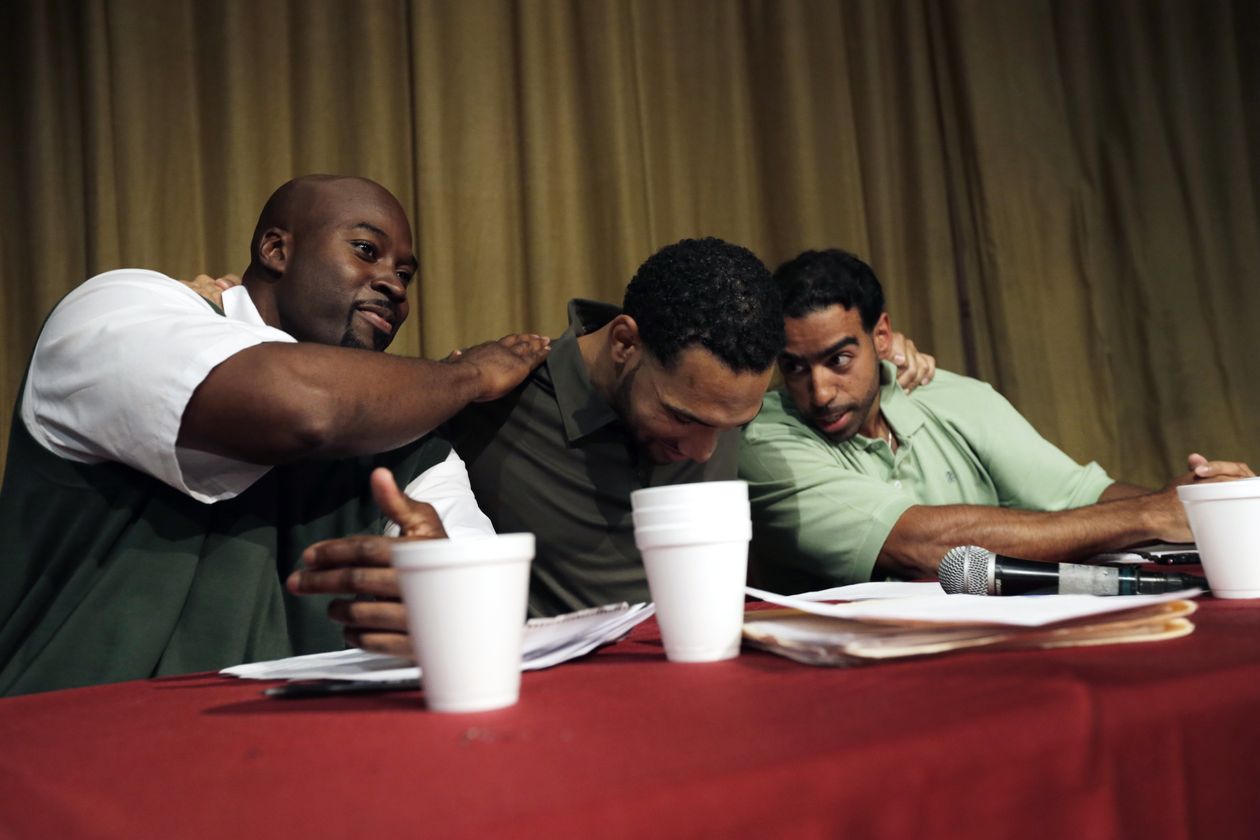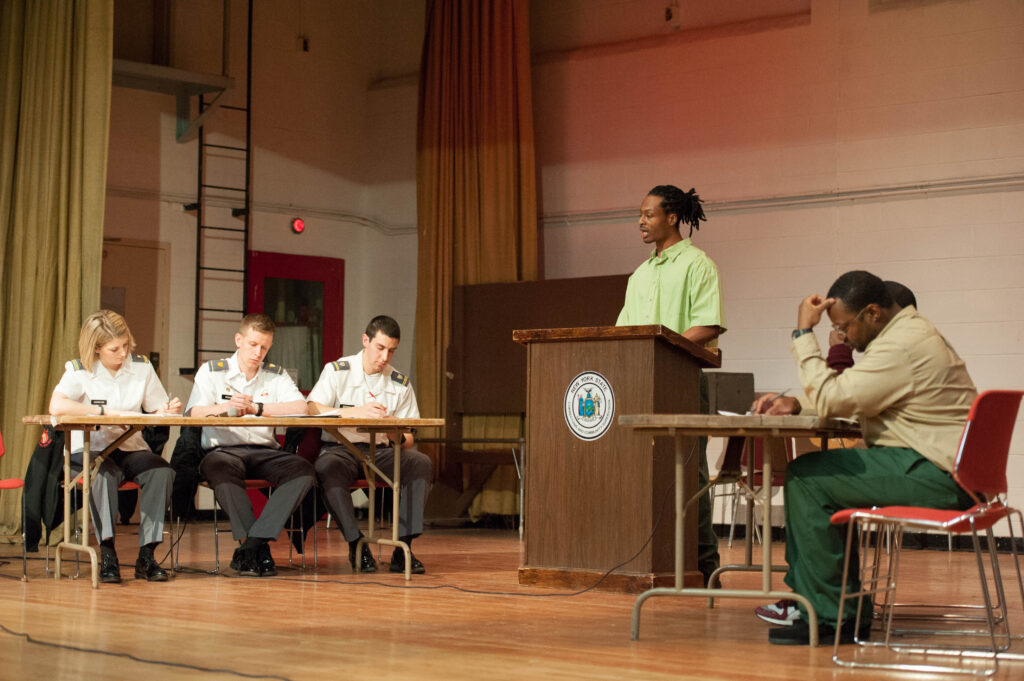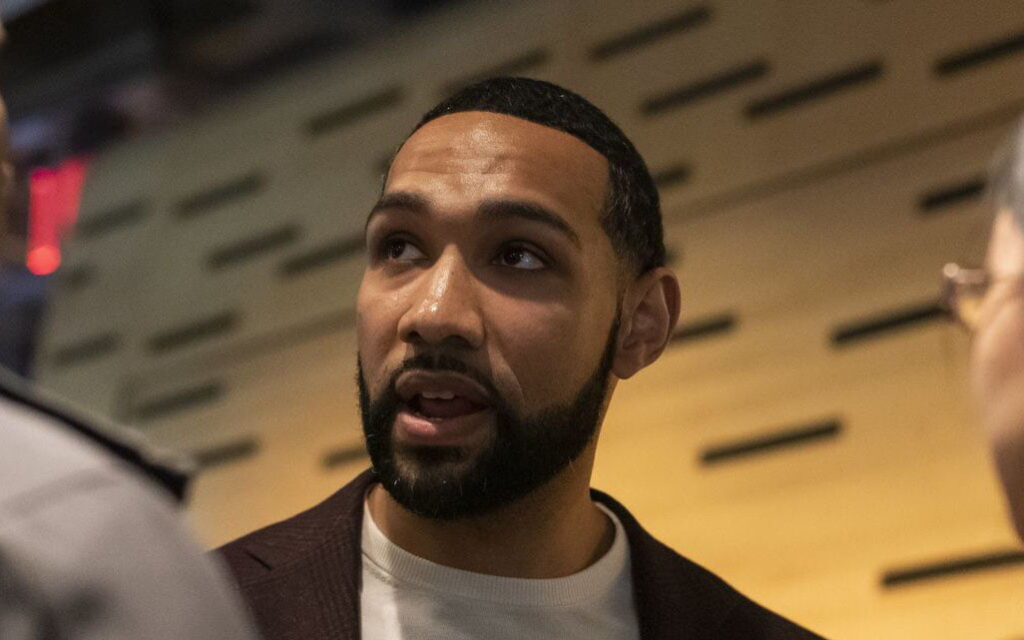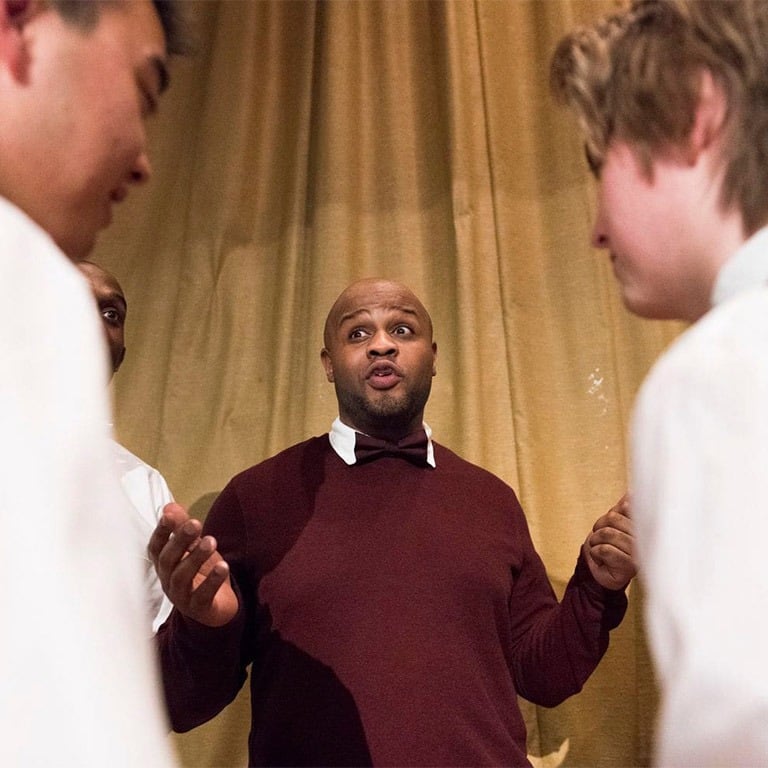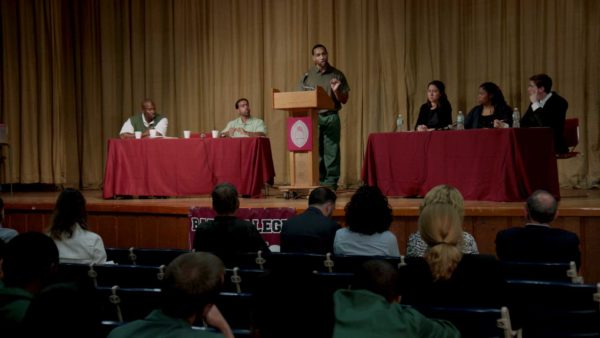
Bard Prison Initiative (BPI) Debate Union defeats Harvard University in September 2015. Photo: Skiff Mountain Films
This month marks the five year anniversary of the BPI Debate Union‘s win against Harvard in September 2015. While the team had been racking up wins since well before the Harvard match, the meet up with Harvard brought international attention to their efforts and challenged prevailing ideas about who incarcerated students are and what they are capable of. That story first broke with an article by Leslie Brody in the Wall Street Journal, which you can find here.
Last year, Brody caught up with the debaters to chronicle the trajectory of their lives since 2015 with a second article: Three [Incarcerated Students] Beat Harvard in a Debate. Here’s What Happened Next.
“Now, the three debaters who outsmarted the Ivy Leaguers have a new round of accomplishments. Two have found professional footing after release. The third, still in prison, has earned a master’s degree and wants to work in public health someday. …
‘We hope we can tell a story that changes the narrative of who people in prison are,’ said Dyjuan Tatro, who took the debate stage that high-pressure afternoon inside Eastern New York Correctional Facility in the Catskills. He calls his team’s triumph ‘a story about hard work, redemption and hope.’ “
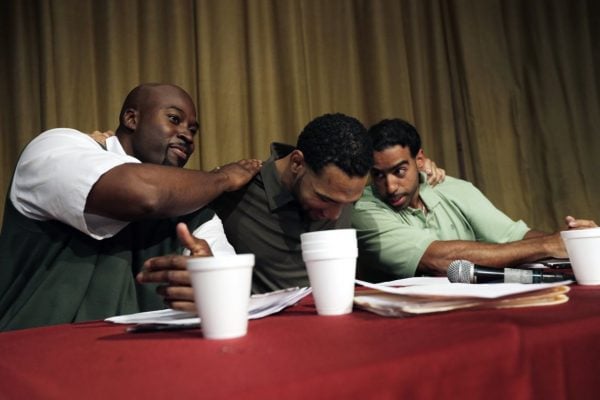
Members of the Bard Prison Initiative debate team, from left: Carl Snyder, Dyjuan Tatro and Carlos Polanco embraced after winning a debate against Harvard at the Eastern New York Correctional facility in 2015. PHOTO: PETER FOLEY FOR THE WALL STREET JOURNAL
The now celebrated debate was also caught on film by documentarians Lynn Novick, Sarah Botstein, and Ken Burns. Their since released documentary on BPI, titled College Behind Bars, premiered on PBS in November 2019 and is now streaming on PBS, Netflix, and Amazon Prime.
Lesley Brody’s article was quickly picked up by other outfits and the story soon went viral, making international headlines. While this level of attention to the story came as a bit of a surprise to students and staff, the novelty and hoopla surrounding the story was a predictable reflection of widespread cynicism that fuels low expectations about incarcerated people.
Too often, the story of Harvard students losing to Bard students in prison got lost under memes and headlines such as the Associated Press headline “Harvard’s prestigious debate team loses to New York prison inmates,” which was picked by the Guardian and many other outlets.
But at its best, the story’s notoriety reflected a growing awareness of the crisis of mass incarceration and the untapped and often ignored the potential of people in prison. As Eddie Ellis famously asserted in the early 1990s and scores of academic researchers have since echoed, for 40 years mass incarceration has been deeply geographically concentrated in poor Black communities that are hyper-policed and overlap with the fewest resources and educational opportunities and the highest health disparities and unemployment rates.
The celebration of the BPI Debate Union’s win was, in many cases, a recognition of societal failures stemming from the systemic criminalization of BIPOC youth and the school-to-prison pipeline. It was a celebration of hope and education over cynicism and punishment. It was a recognition of how widely distributed capacity is across society, even as opportunity is distributed in no such way.
As journalist Jamil Smith later noted in Rolling Stone: “Incarcerated People Can do More Than Beat Harvard in a Debate.” *snaps*
To be sure, the viral attention to the debate story was also a reflection of how much the world liked to dump on Harvard. While few observers minded the jabs at elitist assumptions of merit and talent often associated with the ivy league, the BPI debaters themselves praised the Harvard students’ overwhelming grace in the immediate aftermath of the debate and as the story took off.
Reactions to the win
Why you shouldn’t be surprised that prisoners crushed Harvard’s debate team http://t.co/joZobjqlWz
— The Washington Post (@washingtonpost) October 7, 2015
How a team of prison inmates beat Harvard at a debate http://t.co/8wzxWUHUQ1 pic.twitter.com/3u5UQSD6Cb
— Vox (@voxdotcom) October 11, 2015
Prison-to-College Pipeline? Inmates Best Harvard Debate Team in Higher Ed Schooling Behind Bars https://t.co/IMDHJ9jazU
— Democracy Now! (@democracynow) October 31, 2015
Prisoners in Bard College’s Prison Initiative Program Beat #Harvard Students in Debate last Friday! http://t.co/w5EGKRAVJS #AAAS123x
— Elizabeth Hinton (@elizabhinton) September 21, 2015
Prison Debate Team Defeats Harvard In Amazing Victory: The post Prison Debate Team Defeats Harvard In Amazing… http://t.co/HaZoBCYyIQ
— BLCKBrooklyn (@BLCKBrooklyn) October 15, 2015
Prison debate team v Harvard: “Our debaters are students first and debaters second – and prisoners a distant third” http://t.co/B0SKzmBuQv
— Guardian US (@GuardianUS) October 9, 2015
But, like for real. To be the RNC or DNC presidential nominee you should have to debate the Bard Prison Initiative debate team. #DemDebate
— Natasha Rothwell (@natasharothwell) October 14, 2015
Someone should make a movie about this true story – inmates from @BARDCollege prison debate team defeat Harvard. http://t.co/fJVjKjQfDx
— John King (@SecretaryKing44) September 29, 2015
Dyjuan: “Harvard, tell me this…”
Harvard debaters, no longer wanting any parts of this debate: #CollegeBehindBarsPBS pic.twitter.com/NpQRRSrWMh
— Maya A. Jones (@MJay615) November 27, 2019
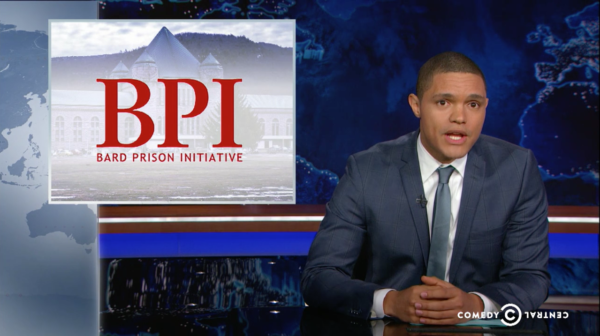
More recently, the BPI Debate Union defeated Cambridge University and then Duke, pulling their record up to ten and two. The Cambridge debate was covered by the Washington Post. In that article, several members of the debate union reflected on the Harvard win, alongside the more recent besting of Cambridge University.
“I had broken unimaginable promises, the promise of my own future, the promise of what I could be,” said Elias Beltran, a recently released [BPI alum] who was on the debate team when it beat Harvard. “To be part of the team . . . it’s a way of proving that these promises weren’t completely lost.”
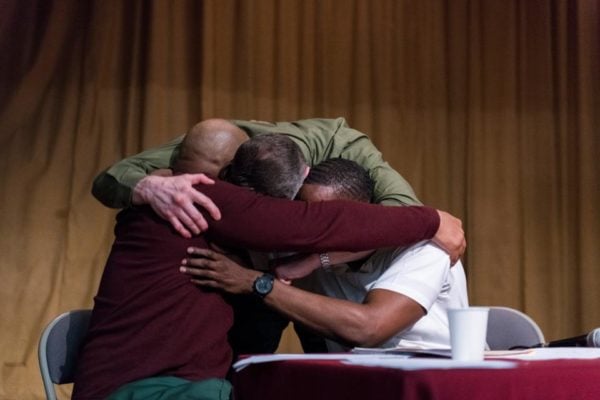
NAPANOCH, NY – APRIL 19: The Bard Prison debate reacts to defeating the Cambridge University debate team at Eastern Correctional Facility. Cambridge University, is the world’s top ranked debate team. Cambridge was invited to come to the prison and compete against the the Bard Prison Initiative. (Michael Noble, Jr. for The Washington Post via Getty Images)
BPI Debate Union History
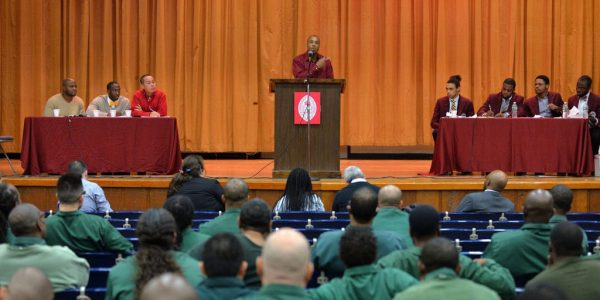
In April 2014, BPI hosted and won its first intercollegiate debate against West Point on the question of whether the US government should invest in a national high-speed rail system. They won. Since then, almost 100 students have been members of the BPI Debate Union, building a successful record against debaters from internationally respected teams such as Harvard, Cambridge, and Morehouse.
BPI Faculty Fellow and Director of Debate David Register has led the team from its inception and meets weekly with members to analyze research, discuss strategy, and practice debate. He is also Co-Director of the Bard Debate Union on the college’s main campus, which promotes civic discourse, dialogue, and debate throughout the Bard community, the greater Hudson Valley region of New York, and the world at large.
OUR RECORD
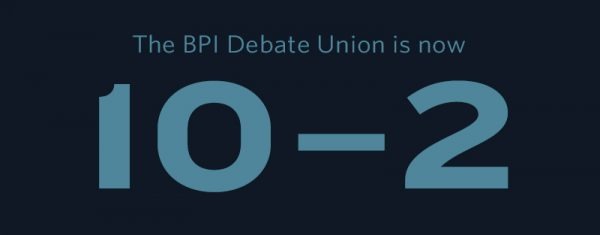
Vs. Duke University, November 2019, Winner: Bard
Topic: The United States Federal Government should provide substantial support for clinical trial of human germ-line genome editing.
Vs. University of Cambridge, April 2019, Winner: Bard
Topic: All states should have a right to nuclear weapons.
Vs. University of Pennsylvania, November 2018, Winner: Bard
Topic: Puerto Rico should be a U.S. state.
Vs. West Point, April 2018, Winner: Bard
Topic: The United States should nationalize its water resources.
Vs. Morehouse, December 2017, Winner: Bard
Topic – Resolved: Race-based affirmative action in college and university admissions should be eliminated.
Vs. West Point, April 2017, Winner: Bard
Topic – Resolved: the rapid automation of labor does more harm than good.
Vs. Brown, September 2016, Winner: Brown
Topic – Resolved: the President of the United States should be elected by popular vote.
Vs. West Point, April 2016, Winner: Bard
Topic – Resolved: American corporations should not have constitutional rights.
Vs. Harvard, September 2015, Winner: Bard
Topic – Resolved: Public schools in the United States should have the ability to deny enrollment to undocumented students.
Vs. West Point, April 2015, Winner: West Point
Topic – Resolved: The United States Federal Government should nationalize the pharmaceutical industry.
Vs. the University of Vermont, September 2014, Winner: Bard
Topic – Resolved: NATO should be immediately disbanded.
Vs. West Point, April 2014, Winner: Bard
Topic – Resolved: The United Stated Federal Government should invest in a national high speed rail system.
